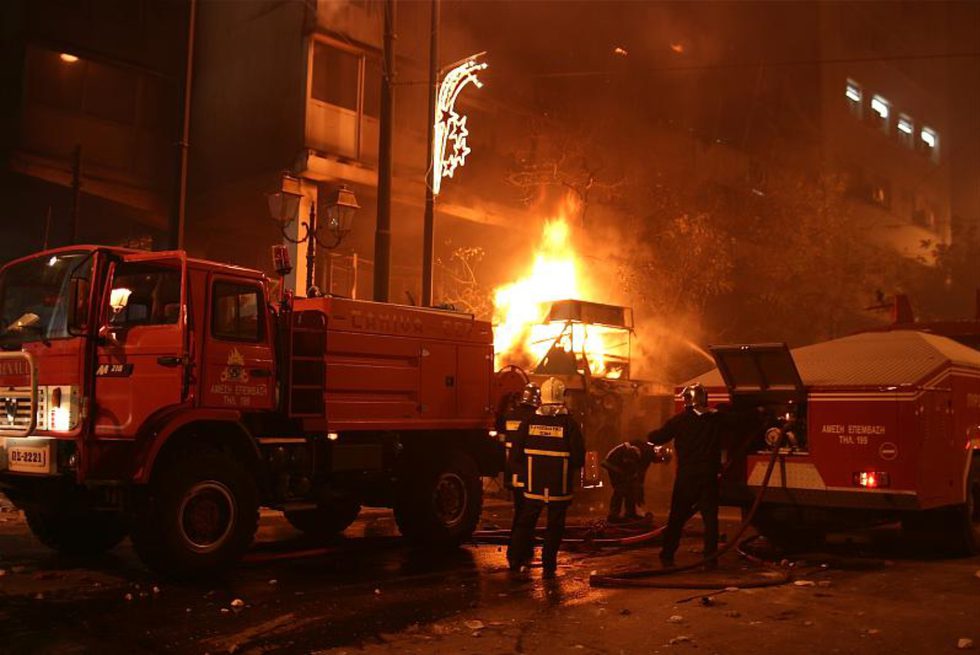Grassroots Oral History Groups: Creating New Identities and a New Narrative
From the Series: Greece is Burning
From the Series: Greece is Burning

Since 2010, Greece has been going through a labyrinthine crisis that has touched and dramatically changed all aspects of people’s lives and frames of reference, from the city to the neighborhood to the family. Greek society is in transition: something old is disappearing and something new is being born. The acceleration of history (a common phenomenon in times of crisis) and the transformation of people’s everyday lives has also transformed their identities. Thus, the social body, while it tries to form its new identity, is obliged to create a new narrative about its past in order to overcome this multifaceted crisis and envision a better future.
This formation of a new Greek identity cannot be captured effectively by either academic or public history. Oral testimony, on the other hand, is a privileged tool for analyzing rapid social changes that restructure the foundations of society. Accordingly, the development of oral history and the evolution of grassroots oral history groups are rooted in the specific historical conjuncture of crisis. People’s suffering has spurred the demand for a truth more powerful than history—that of personal experience and individual memory (Nora 2001). The social nature of this outbreak of memory is linked to what might be called, by analogy with acceleration, the democratization of history (Nora 2002). This is why in Greece, and particularly in Athens, where the crisis is deeper than in the countryside, oral history has become a people’s project.
The first Omada Proforikis Istorias (OPI; Oral History Group) in Athens was created in 2011, during a period of intense social mobilization around the world: the Indignados at Puerta del Sol in Madrid and Syndagma Square in Athens, the Occupy movement in the United States, and the Arab Spring in North Africa and the Middle East. In 2012, this first OPI organized a public presentation of its work, which was met with great and unexpected success. Another OPI was established in 2013, followed by four new OPI groups in 2014. That year also marked the period in which austerity measures initiated by the Troika in order to “save” the Greek economy hit not only the poor but also the middle class—that is, almost the entire Greek population. In 2015 three new OPI groups were established, despite it being a year of turmoil associated with two rounds of elections (in January and September) and the fraught July 6 referendum. That year all of the OPI groups cooperated to organize a three-day Oral History Festival entitled “The City Narrates” at the Cultural Center of Athens Municipality.
The OPIs have been founded in both elite and run-down neighborhoods, by people who did not previously know each other. All of the groups’ members are volunteers. After a twenty-hour training seminar, they start collecting oral testimonies. They are not part of any funded program and, therefore, they have no money at their disposal. This lack of financial and material resources reinforces the social dynamic among the team members, who are committed to working together on a collaborative project.
The creation of the OPIs may be considered part of a broader spectrum of initiatives that ordinary people have undertaken, working outside the old institutional and political frameworks and covering cultural as well as economic needs. The movement of food distribution without market middlemen serves as another case in point: producers sell cheese, honey, rice, and olive oil, for example, at street markets organized by local collective structures of solidarity (Rakopoulos 2014). The aim of both producers and consumers is to face and fight the humanitarian crisis directly by creating and maintaining another kind of market beyond the formal one. Similarly, the OPI groups have committed to the effort of writing history outside of academe.
More or less consciously, the members of the OPIs speak out with critical voices about what is happening in Greece and what this has to do with our global(izing) world, with the European Union, International Monetary Fund, United States, China, and so on. The creation of an OPI in a neighborhood posits the significance of the local. The collection of personal testimonies constitutes a kind of resistance against impersonal markets which, instrumentally, have no memory. The OPIs strive to create a new narrative—one shaped by ordinary people’s memories—in order to regain Greek dignity and to claim a better future for all.
Nora, Pierre. 2001. “The Tidal Wave of Memory.” Project Syndicate, June 21.
_____. 2002. “Reasons for the Current Upsurge in Memory.” Transit, April 19.
Rakopoulos, Theodoros. 2014. “Resonance of Solidarity: Meanings of a Local Concept in Anti-Austerity Greece.” Journal of Modern Greek Studies 32, no. 2: 313–37.